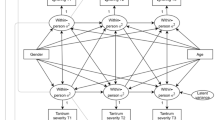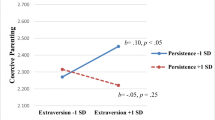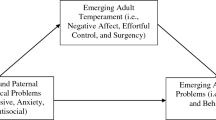Abstract
The coparenting between grandparents and parents is increasingly prevalent in Chinese society. Based on the family system theory and the differential susceptibility model, the current study examined (a) the relative associations of maternal and grandparental psychological control with children’s behavioral problems; (b) the interactive effects of maternal and grandparental psychological control on children’s behavioral problems; and (c) the moderation role of children’s temperamental reactivity. The sample included 241 Chinese multigenerational families with preschool children (130 boys, Mage = 4.88 years, SD = 1.04). Mothers and grandparents reported their psychological control and children’s behavioral problems. Mothers also rated children’s temperamental reactivity. The results showed that only maternal psychological control was uniquely associated with more children’s behavioral problems. There was no interaction between maternal and grandparental psychological control. However, children’s temperamental reactivity moderated associations between grandparental psychological control and children’s behavioral problems. Specifically, grandparental psychological control was positively linked to children’s behavioral problems only for highly reactive children. This finding highlighted the susceptibility of children with high reactivity to grandparental psychological control, raising the possibility of targeted interventions to facilitate children’s development.
Highlights
-
In Chinese multigenerational families, maternal psychological control played a more significant role in preschool children’s behavioral problems than grandparental psychological control.
-
There was no interaction between maternal and grandparental psychological control.
-
High reactive children were more susceptible to grandparental psychological control.


Similar content being viewed by others
References
Aiken, L. S., & West, S. G. (1991). Multiple regression: Testing and interpreting interactions. Sage.
Allison, P. (2002). Missing data: quantitative applications in the social sciences. British Journal of Mathematical and Statistical Psychology, 55, 193–196. https://doi.org/10.1348/000711002159653.
Bao, P., Jing, J., Jin, Y., Hu, X., Liu, B., & Hu, M. (2016). Trajectories and the influencing factors of behavior problems in preschool children: a longitudinal study in Guangzhou, China. BMC Psychiatry, 16, 10. https://doi.org/10.1186/s12888-016-0864-z.
Barber, B. K. (1996). Parental psychological control: Revisiting a neglected construct. Child Development, 67(6), 3296–3319. https://doi.org/10.2307/1131780.
Barber, B. K., & Harmon, E. L. (2002). Violating the self: Parental psychological control of children and adolescents. In B. K. Barber (Ed.), Intrusive parenting: How psychological control affects children and adolescents (pp. 15–52). American Psychological Association. https://doi.org/10.1037/10422-002.
Barnett, M. A., Millskoonce, W. R., Gustafsson, H. C., Cox, M., Vernonfeagans, L., Blair, C., Burchinal, P., Burton, L. M., Crnic, K. A., & Crouter, A. C. (2012). Mother-grandmother conflict, negative parenting, and young children’s social development in multigenerational families. Family Relations, 61(5), 864–877. https://doi.org/10.1111/j.1741-3729.2012.00731.x.
Barnett, M. A., Scaramella, L. V., McGoron, L., & Callahan, K. (2011). Coparenting cooperation and child adjustment in low-income mother-grandmother and mother-father families. Family Science, 2(3), 159–170. https://doi.org/10.1080/19424620.2011.642479.
Bates, J. E., & Pettit, G. S. (2015). Temperament, parenting, and socialization. In J. E. Grusec & P. D. Hastings (Eds.), Handbook of socialization (2 ed., pp. 372–397). The Guilford Press.
Belsky, J., & Pluess, M. (2009). Beyond diathesis stress: differential susceptibility to environmental influences. Psychological Bulletin, 135(6), 885–908. https://doi.org/10.1037/a0017376.
Bornstein, M. H., & Sawyer, J. (2005). Family system. In K. McCartney & D. Phillips (Eds.), Blackweel handbook of early childhood development (pp. 381–398). Blackwell.
Bullock, A., Liu, J., Cheah, C. S. L., Coplan, R. J., Chen, X., & Li, D. (2018). The role of adolescents’ perceived parental psychological control in the links between shyness and socio-emotional adjustment among youth. Journal of Adolescence, 68, 117–126. https://doi.org/10.1016/j.adolescence.2018.07.007.
Bulotsky-Shearer, R. J., & Fantuzzo, J. W. (2011). Preschool behavior problems in classroom learning situations and literacy outcomes in kindergarten and first grade. Early Childhood Research Quarterly, 26(1), 61–73. https://doi.org/10.1016/j.ecresq.2010.04.004.
Carrasco, M. A., Holgadotello, F. P., Delgado, B., & González-Peña, P. (2016). Reactive temperament traits and behavioural problems in children: The mediating role of effortful control across sex and age. European Journal of Developmental Psychology, 13(2), 197–212. https://doi.org/10.1080/17405629.2015.1083852.
Chen, F., Liu, G., & Mair, C. A. (2011). Intergenerational ties in context: grandparents caring for grandchildren in China. Social Forces, 90(2), 571–594. https://doi.org/10.1093/sf/sor012.
Chen, X., & Jiang, X. (2019). Are grandparents better caretakers? Parental migration, caretaking arrangements, children’s self-control, and delinquency in rural China. Crime & Delinquency, 65(8), 1123–1148. https://doi.org/10.1177/0011128718788051.
Chen, Y., Zhu, J., Yu, C., Wang, M., Zhu, Y., & Zhang, W. (2020). The explanatory mechanism of child impulsivity in the bidirectional associations between parental psychological control and child physical aggression. Journal of Child and Family Studies, 29(7), 2039–2050. https://doi.org/10.1007/s10826-019-01650-y.
Cho, H. S., Cheah, C. S. L., Vu, K. T. T., Selçuk, B., Yavuz, H. M., Şen, H. H., & Park, S. (2021). Culturally shared and unique meanings and expressions of maternal control across four cultures. Developmental Psychology, 57(2), 284–301. https://doi.org/10.1037/dev0001136.
Curtindale, L., Laurie-Rose, C., Bennett-Murphy, L., & Hull, S. (2007). Sensory modality, temperament, and the development of sustained attention: a vigilance study in children and adults. Developmental Psychology, 43(3), 576–589. https://doi.org/10.1037/0012-1649.43.3.576.
Deneault, A., Gareau, A., Bureau, J., Gaudreau, P., & Lafontaine, M. (2020). Fear of failure mediates the relation between parental psychological control and academic outcomes: a latent mediated-moderation model of parents’ and children’s genders. Journal of Youth and Adolescence, 49(8), 1567–1582. https://doi.org/10.1007/s10964-020-01209-x.
Du, Y., Kou, J., Wang, X., Xia, L., & Zou, R. (2006). A study on the strengths and difficulties questionnaire(SDQ). Chinses Journal of Psychological Science, 29(6), 1419–1421. https://doi.org/10.3969/j.issn.1671-6981.2006.06.032.
Goodman, R. (1997). The strengths and difficulties questionnaire: a research note. Journal of Child Psychology and Psychiatry, 38(5), 581–586. https://doi.org/10.1111/j.1469-7610.1997.tb01545.x.
Greven, C. U., Lionetti, F., Booth, C., Aron, E. N., Fox, E., Schendan, H. E., Pluess, M., Bruining, H., Acevedo, B., Bijttebier, P., & Homberg, J. (2019). Sensory orocessing sensitivity in the context of environmental sensitivity: a critical review and development of research agenda. Neuroscience & Biobehavioral Reviews, 98, 287–305. https://doi.org/10.1016/j.neubiorev.2019.01.009.
Hartz, K., & Williford, A. (2015). Child negative emotionality and caregiver sensitivity across context: links with children’s kindergarten behaviour problems. Infant and Child Development, 24(2), 107–129. https://doi.org/10.1002/icd.1887.
Helwig, C. C., To, S., Wang, Q., Liu, C., & Yang, S. (2014). Judgments and reasoning about parental discipline involving induction and psychological control in China and Canada. Child Development, 85(3), 1150–1167. https://doi.org/10.1111/cdev.12183.
Hill-Soderlund, A. L., & Braungart-Rieker, J. M. (2008). Early individual differences in temperamental reactivity and regulation: implications for effortful control in early childhood. Infant Behavior & Development, 31(3), 386–397. https://doi.org/10.1016/j.infbeh.2007.12.007.
Hoang, N. T., Haslam, D., & Sanders, M. (2020). Coparenting conflict and cooperation between parents and grandparents in Vietnamese families: the role of grandparent psychological control and parent–grandparent communication. Family Process, 59(3), 1161–1174. https://doi.org/10.1111/famp.12496.
Hoang, N. T., & Kirby, J. N. (2020). A meta-ethnography synthesis of joint care practices between parents and grandparents from Asian cultural backgrounds: benefits and challenges. Journal of Child and Family Studies, 29(3), 605–619. https://doi.org/10.1007/s10826-019-01553-y.
Ko, P., & Hank, K. (2014). Grandparents caring for grandchildren in China and Korea: findings from CHARLS and KLoSA. Journals of Gerontology, Series B: Psychological Sciences and Social Sciences, 69(4), 646–651. https://doi.org/10.1093/geronb/gbt129.
Laird, R. D., & Frazer, A. L. (2020). Psychological reactance and negative emotional reactions in the link between psychological control and adolescent adjustment. Social Development, 29(1), 159–177. https://doi.org/10.1111/sode.12407.
Leung, C., & Fung, B. (2014). Non-custodial grandparent caregiving in Chinese families: implications for family dynamics. Journal of Children’s Services, 9(4), 307–318. https://doi.org/10.1108/JCS-04-2014-0026.
Li, J., Ahemaitijiang, N., Han, Z. R., & Jin, Z. (2018). Grandparents’ parenting on children’s internalizing symptoms: the serial mediation of parents’ psychological control and children’s emotion regulation. Journal of family Issues, 39(17), 3996–4018. https://doi.org/10.1177/0192513X18804284.
Li, R., Yao, M., Liu, H., & Chen, Y. (2019). Relationships among autonomy support, psychological control, coping, and loneliness: comparing victims with nonvictims. Personality and Individual Differences, 138, 266–272. https://doi.org/10.1016/j.paid.2018.10.001.
Li, X., Zhou, S., & Guo, Y. (2020). Bidirectional longitudinal relations between parent–grandparent co-parenting relationships and Chinese children’s effortful control during early childhood. Frontiers in Psychology, 11, 152. https://doi.org/10.3389/fpsyg.2020.00152.
Lu, M., Walsh, K., White, S., & Shield, P. (2017). The associations between perceived maternal psychological control and academic performance and academic self-concept in Chinese adolescents: the mediating role of basic psychological needs. Journal of Child and Family Studies, 26(5), 1285–1297. https://doi.org/10.1007/s10826-016-0651-y.
Luebbe, A. M., Tu, C., & Fredrick, J. W. (2018). Socialization goals, parental psychological control, and youth anxiety in Chinese students: moderated indirect effects based on school type. Journal of Youth and Adolescence, 47(2), 413–429. https://doi.org/10.1007/s10964-017-0784-3.
Luo, N., Van Heel, M., & Van Leeuwen, K. (2020). Perspectives of early adolescents, parents, and grandparents on parenting behaviors in China. The Journal of Early Adolescence, 40(8), 1244–1274. https://doi.org/10.1177/0272431620912476.
Muhtadie, L., Zhou, Q., Eisenberg, N., & Wang, Y. (2013). Predicting internalizing problems in Chinese children: the unique and interactive effects of parenting and child temperament. Development and psychopathology, 25(3), 653–667. https://doi.org/10.1017/S0954579413000084.
National Health and Family Planning Commission of the People’s Republic of China (NHFPC of PRC). (2016). China Family Development Report 2016. Beijing, China: China Population Publishing House.
Netsi, E., van Ijzendoorn, M., Bakermans-Kranenburg, M., Wulff, K., Jansen, P. W., Jaddoe, V. W. V., Verhulst, F. C., Tiemeier, H., & Ramchandani, P. G. (2015). Does infant reactivity moderate the association between antenatal maternal depression and infant sleep? Journal of Developmental and Behavioral Pediatrics, 36(6), 440–449. https://doi.org/10.1097/DBP.0000000000000181.
Ng, F. F., Pomerantz, E. M., & Deng, C. (2014). Why are Chinese mothers more controlling than American mothers? “My child is my report card”. Child Development, 85(1), 355–369. https://doi.org/10.1111/cdev.12102.
Olsen, S. F., Yang, C., Hart, C. H., Robinson, C. C., Wu, P., Nelson, D. A., Nelson, L. J., Jin, S., & Wo, J. (2002). Maternal psychological control and preschool children’s behavioral outcomes in China, Russia, and the United States. In B. K. Barber (Ed.), Intrusive parenting: How psychological control affects children and adolescents. (pp. 235–262). American Psychological Association. https://doi.org/10.1037/10422-008.
Pinquart, M. (2017a). Associations of parenting dimensions and styles with externalizing problems of children and adolescents: an updated meta-analysis. Developmental Psychology, 53(5), 873–932. https://doi.org/10.1037/dev0000295.
Pinquart, M. (2017b). Associations of parenting dimensions and styles with internalizing symptoms in children and adolescents: a meta-analysis. Marriage and Family Review, 53(7), 613–640. https://doi.org/10.1080/01494929.2016.1247761.
Poehlmann, J., Hane, A., Burnson, C., Maleck, S., Hamburger, E., & Shah, P. E. (2012). Preterm infants who are prone to distress: differential effects of parenting on 36-month behavioral and cognitive outcomes. Journal of Child Psychology and Psychiatry, 53(10), 1018–1025. https://doi.org/10.1111/j.1469-7610.2012.02564.x.
Profe, W., & Wild, L. G. (2017). Mother, father, and grandparent involvement: associations with adolescent mental health and substance use. Journal of family Issues, 38(6), 776–797. https://doi.org/10.1177/0192513x15583069.
Ramchandani, P. G., van Ijzendoorn, M., & Bakermans-Kranenburg, M. J. (2010). Differential susceptibility to fathers’ care and involvement: the moderating effect of infant reactivity. Family Science, 1(2), 93–101. https://doi.org/10.1080/19424621003599835.
Rogers, K. N., Buchanan, C. M., & Winchell, M. E. (2003). Psychological control during early adolescence links to adjustment in differing parent/adolescent dyads. Journal of Early Adolescence, 23(4), 349–383. https://doi.org/10.1177/0272431603258344.
Roman, G. D., Ensor, R., & Hughes, C. (2016). Does executive function mediate the path from mothers’ depressive symptoms to young children’s problem behaviors? Journal of Experimental Child Psychology, 142, 158–170. https://doi.org/10.1016/j.jecp.2015.09.022.
Scharf, M., & Goldner, L. (2018). “If you really love me, you will do/be…”: parental psychological control and its implications for children’s adjustment. Developmental Review, 49, 16–30. https://doi.org/10.1016/j.dr.2018.07.002.
Shek, D. T. L. (2007). A longitudinal study of perceived differences in parental control and parent–child relational qualities in Chinese adolescents in Hong Kong. Journal of Adolescent Research, 22(2), 156–188. https://doi.org/10.1177/0743558406297509.
Shek, D. T. L., Zhu, X., & Dou, D. (2019). Influence of family processes on internet addiction among late adolescents in Hong Kong. Frontiers in Psychiatry, 10, 113. https://doi.org/10.3389/fpsyt.2019.00113.
Soenens, B., & Vansteenkiste, M. (2010). A theoretical upgrade of the concept of parental psychological control: proposing new insights on the basis of self-determination theory. Developmental Review, 30(1), 74–99. https://doi.org/10.1016/j.dr.2009.11.001.
Sun, L., Liang, L., & Bian, Y. (2017). Parental psychological control and peer victimization among Chinese adolescents: the effect of peer pressure as a mediator. Journal of Child and Family Studies, 26(12), 3278–3287. https://doi.org/10.1007/s10826-017-0834-1.
Van den Berg, H., & Bus, A. G. (2014). Beneficial effects of BookStart in temperamentally highly reactive infants. Learning Individual Differences, 36, 69–75. https://doi.org/10.1016/j.lindif.2014.10.008.
Vansteenkiste, M., & Ryan, R. M. (2013). On psychological growth and vulnerability: basic psychological need satisfaction and need frustration as a unifying principle. Journal of Psychotherapy Integration, 23(3), 263–280. https://doi.org/10.1037/a0032359.
Vansteenkiste, M., Ryan, R. M., & Soenens, B. (2020). Basic psychological need theory: advancements, critical themes, and future directions. Motivation and Emotion, 44(2), 1–31. https://doi.org/10.1007/s11031-019-09818-1.
Wang, G., Takahashi, M., Wu, R., Liu, Z., Adachi, M., Saito, M., Nakamura, K., & Jiang, F. (2020). Association between sleep disturbances and emotional/behavioral problems in Chinese and Japanese preschoolers. Behavioral Sleep Medicine, 18(3), 420–431. https://doi.org/10.1080/15402002.2019.1605995.
Wang, J., Shi, X., Yang, Y., Zou, H., Zhang, W., & Xu, Q. (2019). The joint effect of paternal and maternal parenting behaviors on school engagement among Chinese adolescents: the mediating role of mastery goal. Frontiers in Psychology, 10, 14 https://doi.org/10.3389/fpsyg.2019.01587.
Wang, M., Zhang, Y., Yu, J., & Xing, X. (2012). Relationship among preschoolers’ anxiety, temperament, and family environment. Chinese Journal of Clinical Psychology, 20(3), 371–373. 397. CNKI:SUN:ZLCY.0.2012-03-025.
Wang, Q., Pomerantz, E. M., & Chen, H. (2007). The role of parents’ control in early adolescents’ psychological functioning: a longitudinal investigation in the United States and China. Child Development, 78(5), 1592–1610. https://doi.org/10.1111/j.1467-8624.2007.01085.x.
Xing, S., Gao, X., Song, X., Archer, M., Zhao, D., Zhang, M., Ding, B., & Liu, X. (2017). Chinese preschool children’s socioemotional development: the effects of maternal and paternal psychological control. Frontiers in Psychology, 8, 1818 https://doi.org/10.3389/fpsyg.2017.01818.
Xing, S., Zhou, Q., Archer, M., Yue, J., & Wang, Z. (2016). Infant temperamental reactivity, maternal and grandparental sensitivity: differential susceptibility for behavior problems in China. Early Human Development, 101, 99–105. https://doi.org/10.1016/j.earlhumdev.2016.08.014.
Xu, H. (2019). Physical and mental health of Chinese grandparents caring for grandchildren and great-grandparents. Social Science & Medicine, 229, 106–116. https://doi.org/10.1016/j.socscimed.2018.05.047.
Xu, Y., Farver, J. A. M., & Zhang, Z. (2009). Temperament, harsh and indulgent parenting, and Chinese children’s proactive and reactive aggression. Child Development, 80(1), 244–258. https://doi.org/10.1111/j.1467-8624.2008.01257.x.
Yan, F., Zhang, Q., Ran, G., Li, S., & Niu, X. (2020). Relationship between parental psychological control and problem behaviours in youths: a three-level meta-analysis. Children and Youth Services Review, 112, 104900 https://doi.org/10.1016/j.childyouth.2020.104900.
Zhang, C., Fong, V. L., Yoshikawa, H., Way, N., Chen, X., & Lu, Z. (2019). The rise of maternal grandmother child care in urban Chinese families. Journal of Marriage and Family, 81(5), 1174–1191. https://doi.org/10.1111/jomf.12598.
Zhang, J. (1995). The reliability of parent temperament questionnaire. Journal of Chinese Mental Health, 9(5), 203–205. CNKI:SUN:ZXWS.0.1995-05-006.
Acknowledgements
We are grateful to Dr. Edwina Pendarvis, Professor Emerita of Marshall University, and Dr. Mary Barbara Trube, Professor Emerita of Ohio University, who help to revise and improve the quality of paper.
Funding
This study was funded by the National Social Science Fund of China (grant number 17BSH144).
Author information
Authors and Affiliations
Contributions
S.X. contributed to the study conception and design. Material preparation and data collection and analysis were performed by X.G. and X.F. The first draft of the paper was written by X.G. and Y.R. revised and edited the paper. All authors read and approved the final paper.
Corresponding author
Ethics declarations
Conflict of Interest
The authors declare no competing interests.
Ethical Approval
The study was approved by the Research Ethics Committee of Capital Normal University
Informed Consent
Informed consent was obtained from all individual participants included in the study.
Additional information
Publisher’s note Springer Nature remains neutral with regard to jurisdictional claims in published maps and institutional affiliations.
Rights and permissions
About this article
Cite this article
Gao, X., Yan, R., Fang, X. et al. Intrusive Psychological Control and Children’s Behaviors in Chinese Multigenerational Families: Role of Children’s Temperamental Reactivity. J Child Fam Stud 31, 2582–2593 (2022). https://doi.org/10.1007/s10826-021-02048-5
Accepted:
Published:
Issue Date:
DOI: https://doi.org/10.1007/s10826-021-02048-5




